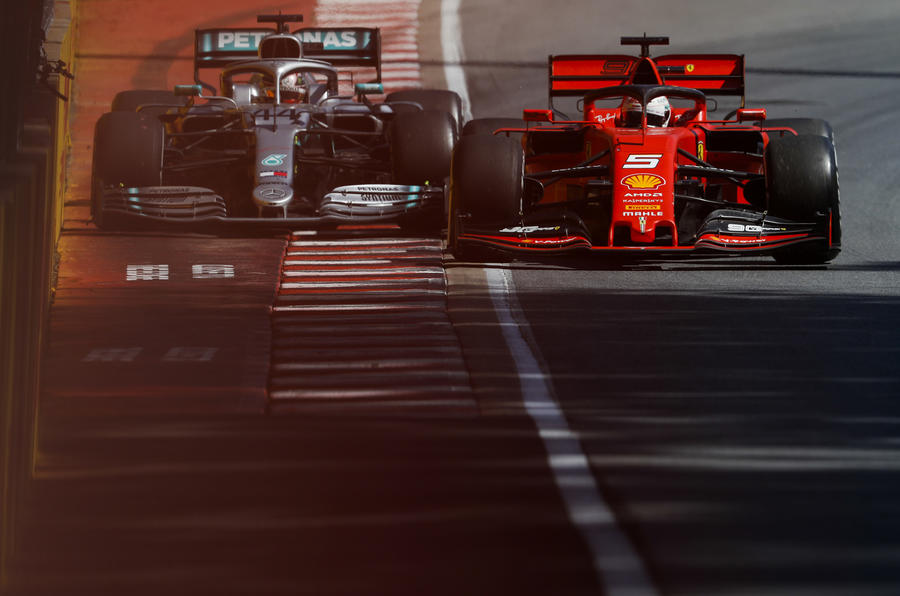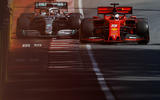Several of us were talking about the Canadian Grand Prix in the office this morning – or, specifically, the penalty that cost Sebastian Vettel victory and handed Lewis Hamilton his fifth win of 2019.
One of my colleagues proffered that it was another example of Formula 1 shooting itself in the foot. I disagreed with that point, for one simple reason: because we were all talking about the Canadian Grand Prix.
If you somehow missed it, Vettel was leading the race in his Ferrari, pushed hard by the Mercedes of Hamilton when, on lap 48, he lost control turning into the fast Turn 3/4 chicane, sliding onto the grass. Vettel had to make numerous corrections to his steering to regain control of his car. As he rejoined the track on the exit of the chicane, Hamilton, on the racing line, was forced to brake to avoid contact. Vettel continued on in the lead.
The stewards handed Vettel a five-second time penalty for rejoining the track in an unsafe manner, effectively handing victory to Hamilton.
It didn’t prove a popular decision with fans at and track and on social media, nor Vettel. Having spent most of the final laps protesting the decision on his radio, at the end of the race he stormed into his motorhome, had to be persuaded to go to the podium and on his way removed the first place board from in front of Hamilton’s car.
Generally speaking, the weight of opinion is that it was wrong to penalise Vettel, because he wasn’t in full control of his car when we rejoined, and that by issuing such penalties, stewards are taking away from wheel-to-wheel racing by deciding battles with penalties rather than on-track passes.
Now, I’d much rather see wheel-to-wheel battling than races decided by stewards. But in my view, this wasn’t a wheel-to-wheel battle but a driver rejoining a circuit after a mistake. Even taking Vettel at his word that he didn’t deliberately block Hamilton, to me it’s not unreasonable that he should face consequences for losing control and going off track. He certainly shouldn’t have benefitted from doing so.
Your view may well be different, and that’s fine. The incident is one of those classic judgement calls, depending on the split-second reactions of a driver at high speeds under immense pressure. It’s not a binary, definitive, right-or-wrong call.
The problem is that the rulebook is all about binary, definitive, right-or-wrong calls.













Join the debate
Add your comment
And the next race....
Will this last controversy spill into the next race?, I bet the commentary will bring it up.
Nothing beats an overtaking
Nothing beats an overtaking by the DRS or in the pits.
@ the colonel, totally agree
@ the colonel, totally agree that the coverage is a poor relation to how it used to be, sky's pay to view is too expensive, the BBC and then c4's free to air live show was great. F1 needs to improve itself to become more of a spectacle and less processionary but we also need to go back to free to view live coverage.
How?
@ si73, you say the F1 has to improve, how?, I’m sure the owners of F1 would like your input, as for the Tv shows, you make your choice, Sky, with too much info, or Ch4 with its coverage, I personally can’t see where you could make F1 more interesting other than silly rules that stop close racing...
@Peter Cavellini
Regarding coverage, I didn't say sky has too much info I said sky is too expensive and that I would like it to go back to the free to view live coverage we used to have, as this is a place to post opinions, which you do readily, I don't see your issue with me or mine or see a need for patronising but since you asked. Regarding F1 racing, it would be nice for them to stop tampering with the racing with penalties, rules need amending accordingly. And perhaps even less reliance on aerodynamic grip and more reliance on mechanical grip to allow the cars to get closer and follow and pass without such negative results as you currently get from following in dirty air. Maybe less fuel saving and tyre management and more outright racing? I am not alone in these sentiments as I have read similar comments before, in fact F1 commentary often says similar.
Totally...
si73@, I agree with your ideas, it’s a shame the people who run the F1 Circus now don't read blogs on F1 by real fans, ask them what they want.........